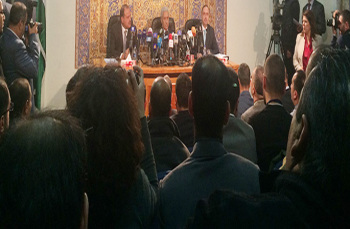Gov’t announces privileges for children of Jordanian women married to foreigners

Rana Husseini, JT
AMMAN — Prime Minister Abdullah Ensour on Sunday announced the government’s approval to grant children of Jordanian women married to foreigners certain privileges and facilities to ease their lives. “Today we meet to fulfil our pledge to the children of our Jordanian daughters by accepting many of what the parliamentary committee suggested by facilitating numerous official matters for their children from a foreign marriage,” Ensour told a press conference at the Prime Ministry.
The premier added that there were points that were rejected by the government “because it might affect the demographic balance in Jordan and might lead to empty Palestine from its people”. He stopped short of giving further details, but his remarks came in an apparent reference to a policy against giving Palestinian nationals living in Jordan, mostly from Gaza, Jordanian nationality.
Interior Minister Hussein Majali elaborated on the privileges that will be granted to children of Jordanian women who are married to foreign men provided that their mothers have been residing in Jordan for a minimum of five years.
The privileges, according to Majali, include free high school education and health services in government schools and institutes for “Jordanian women’s offspring who did not benefit from such privileges if their mothers have resided in Jordan for a minimum of five years”.
In terms of labour rights, Majali said this category “will be given [second] priority after the Jordanian citizens in all professions, including ones they were not allowed to work in the past, and they will be exempted of any work permit fees”.
These children will also be allowed to own property and invest in Jordan, the minister added.
They will also be allowed to obtain a driving licence for passenger cars if they have a residency permit, according to Majali.
Asked by The Jordan Times if the new facilitations will exempt these families from residency permit fees and having to visit police stations annually to renew their residency permit, Majali said that this was not part of the new list of privileges.
“They will still have to go and renew the permit. We should differentiate between facilitating services and the fact that they are not Jordanian citizens,” Majali said.
Majali said that there are 88,983 Jordanian women married to non-Jordanians and these families have 355,932 children registered at the Civil Status and Passports Department (CSPD).
The number of Jordanian women married to Palestinians is the highest with 55,606 records, Majali said. The rest are divided as follows: 8,486 married to Egyptian nationals, 7,731 married to Syrians, 4,549 married to Saudi nationals, 2,822 married to Iraqis, 2,516 married to Americans and 2,048 married to Lebanese.
Women’s rights activists have for years been demanding that Jordanian women be allowed to pass on their citizenship to their children and spouses, a right that only men enjoy.
These women face various difficulties such as obtaining visas and residency permits for their husbands and children, shuttling between police stations and health centres every year to get security clearances and medical reports.
Ensour stressed at the end of the press conference that the government has no intention “now or in the future of granting these children citizenship or accepting them in the army”.
Ensour added that it will take between three to six months to grant these privileges because “we have to put in place several administrative measures and introduce new regulations or amend existing ones to cope with our decision today.”
“We will start by offering special identification cards that will be issued by the CSPD,” the premier said.
Nimat Habashneh, founder of the campaign titled “My mother is Jordanian, and her nationality is a right for me,” praised the new step saying it will be a milestone in the journey to “secure citizenship for our children”.
“The most important thing that happened today was that the government acknowledged that there are rights for Jordanian women married to non-Jordanian men,” Habashneh told The Jordan Times in a phone interview.
This acknowledgement, Habashneh added, is the base for “our campaign to continue strongly and demand citizenship rights and other civil rights such as free higher education at government universities and not having to obtain residency permits or pay a fee”.
Government officials have said in the past that the decision not to allow Jordanian women married to foreigners to pass on their nationality is “solely political”.
Individuals and entities that oppose granting citizenship to family members of these women, particularly those with Palestinian husbands, say such a measure will only work to ensure “Israel’s ultimate plan of creating a substitute homeland for Palestinians in Jordan”.
Palestinian refugees after the 1948 Arab-Israeli war and those who were living in the West Bank when it was occupied from Jordan by Israel in 1967 were given citizenship. The Gaza Strip was administered by Egypt between the two wars.
Latest News
-
 Rainfall exceeds 60% of annual average — Water Ministry
Rainfall exceeds 60% of annual average — Water Ministry
-
 Trump says Iran 'want to negotiate' and meeting 'being set up'
Trump says Iran 'want to negotiate' and meeting 'being set up'
-
 Syrian Army on Alert after SDF Armed Groups Detected East of Aleppo
Syrian Army on Alert after SDF Armed Groups Detected East of Aleppo
-
 Iran Says ‘Prepared for War’ as Alarm Grows over Protest Toll
Iran Says ‘Prepared for War’ as Alarm Grows over Protest Toll
-
 King attends launch of 2026-2029 government executive programme
King attends launch of 2026-2029 government executive programme